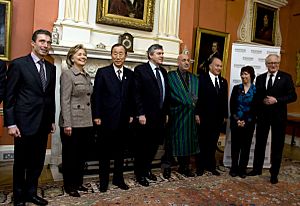Herman Van Rompuy facts for kids
Quick facts for kids
The Count Van Rompuy
|
|
|---|---|
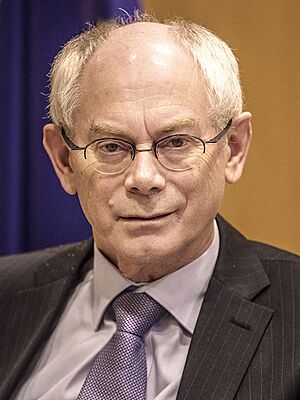
Official portrait, 2012
|
|
| President of the European Council | |
| In office 1 December 2009 – 30 November 2014 |
|
| Preceded by | Fredrik Reinfeldt (non-permanent) |
| Succeeded by | Donald Tusk |
| Prime Minister of Belgium | |
| In office 30 December 2008 – 25 November 2009 |
|
| Monarch | Albert II |
| Deputy | Didier Reynders |
| Preceded by | Yves Leterme |
| Succeeded by | Yves Leterme |
| President of the Chamber of Representatives | |
| In office 12 July 2007 – 30 December 2008 |
|
| Preceded by | Herman De Croo |
| Succeeded by | Patrick Dewael |
| Minister of the Budget | |
| In office 5 September 1993 – 12 July 1999 |
|
| Prime Minister | Jean-Luc Dehaene |
| Preceded by | Mieke Offeciers |
| Succeeded by | Johan Vande Lanotte |
| Member of the Chamber of Representatives | |
| In office 21 May 1995 – 1 December 2009 |
|
| Constituency | Etterbeek |
| Senator | |
| In office 15 June 1988 – 21 May 1995 |
|
| Constituency | Etterbeek |
| Personal details | |
| Born |
Herman Achille Van Rompuy
31 October 1947 Etterbeek, Belgium |
| Political party | Christian Democratic and Flemish |
| Other political affiliations |
European People's Party |
| Spouse | Geertrui Windels |
| Children |
|
| Residences | Sint-Genesius-Rode, Belgium |
| Alma mater | Catholic University of Leuven |
| Signature |  |
Herman Achille, Count Van Rompuy (born 31 October 1947) is a Belgian politician. He served as the Prime Minister of Belgium from 2008 to 2009. Later, he became the first permanent President of the European Council from 2009 to 2014.
Van Rompuy is a member of Belgium's Christian Democratic and Flemish party. He was the 49th Prime Minister of Belgium. He held this role from December 2008 until November 2009. In November 2009, leaders of the EU member states chose him as the first full-time President of the European Council. This new role was created under the Treaty of Lisbon. His first term began in January 2010. He was re-elected for a second term in March 2012, serving until November 2014. In 2019, he became the chairman of the board for the College of Europe.
Contents
About Herman Van Rompuy
His Early Life
Herman Van Rompuy was born in Etterbeek, Brussels, Belgium. His father, Dr. Victor van Rompuy, was a Professor of Economics. Herman went to Sint-Jan Berchmanscollege until 1965. There, he focused on Ancient Greek and Latin. As a teenager, he loved rock and roll, especially Elvis Presley.
He later studied at the Katholieke Universiteit Leuven. He earned a degree in Philosophy in 1968. In 1971, he received a master's degree in Applied Economics. From 1972 to 1975, he worked at the Belgian Central Bank. He also taught at several universities between 1980 and 1987.
His Family
Van Rompuy is married to Geertrui Windels. They have four children: Peter, Laura, Elke, and Thomas. His oldest son, Peter, is also involved in the Christian Democratic and Flemish (CD&V) political party.
His younger brother, Eric Van Rompuy, is also a politician in the CD&V party. He served as a minister in the Flemish Government. His sister, Tine Van Rompuy, is connected to the Workers' Party of Belgium.
His Political Journey
Starting in Politics
Van Rompuy led the youth council of the Christian People's Party (CVP) from 1973 to 1977. He worked for government ministers from 1975 to 1980. In 1988, he was first elected to the Belgian Senate, serving until 1995. He also briefly served as Secretary of State for Finance in 1988. After that, he became the national chairman of the CVP from 1988 to 1993.
Belgian Minister of Budget (1993–1999)
From September 1993 to July 1999, Van Rompuy was the Deputy Prime Minister and Minister of Budget. He worked in two governments led by Jean-Luc Dehaene. As budget minister, he helped reduce Belgium's national debt. The debt fell from 135% of the country's total economic output (GDP) in 1993 to below 100% by 2003.
Member of the Belgian Parliament (1995–2009)
He was elected to the Belgian Chamber of Representatives in 1995. After his party lost the 1999 election, he became a full member of the Chamber. He was re-elected in 2003 and 2007. In 2004, he was given the special title of Minister of State.
Views on Turkey and the EU
Before becoming President of the European Council, Van Rompuy had concerns about Turkey joining the European Union. He once said that Turkey is not Europe.
However, as President, he changed his public stance. In December 2010, he stated that Turkey's reform efforts had shown "impressive results." He also said that the European Union should build a close partnership with Turkey.
President of the Belgian Parliament (2007–2008)
After eight years, Van Rompuy's party, CD&V, returned to government. On 12 July 2007, Van Rompuy was elected as the President of the Belgian Chamber of Representatives.
Prime Minister of Belgium
On 28 December 2008, King Albert II asked Van Rompuy to form a new government. This happened after a political crisis in Belgium. He became the Belgian Prime Minister on 30 December 2008.
Government Finances
In October 2009, news reports said that Van Rompuy's government planned to tax banks and nuclear power companies. This was to help reduce the country's budget deficit (when the government spends more than it earns).
Van Rompuy said that Belgium was starting to recover economically. He stressed the importance of not weakening this new confidence. He also said it was important to build a strong, lasting recovery.
His government aimed to lower the budget deficit. They also worked to manage the national debt. Belgium's debt had increased due to financial support given to banks during a crisis.
Dealing with Energy Companies
In October 2009, Van Rompuy's government signed an agreement with GDF Suez, a large energy company. This agreement was about fees for nuclear power in Belgium. There had been a disagreement about a €250 million fee for a "Renewable Energy Fund."
President of the European Council (2009–2014)
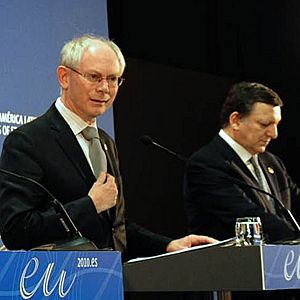
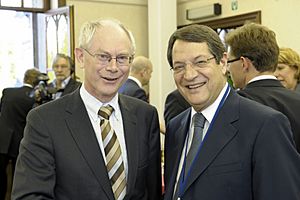


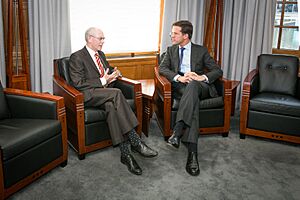

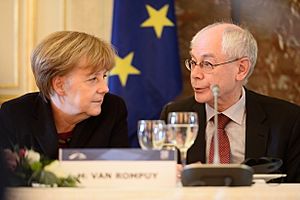
On 19 November 2009, the European Council chose Van Rompuy to be its first full-time President. This new role started on 1 December 2009. His first term lasted until 31 May 2012. He officially began his work on 1 January 2010.
Gordon Brown, a former British Prime Minister, praised Van Rompuy. He called him a "consensus-builder" who brought stability to Belgium. Van Rompuy himself described his approach: "Every country should emerge victorious from negotiations." He saw his role as a "facilitator," helping 27 leaders find common ground.
Not everyone welcomed him positively. A British politician, Nigel Farage, made some critical remarks about him. These comments caused controversy, and Farage was fined for them.
In November 2009, Van Rompuy spoke about "global governance." He mentioned the G20 group of major economies and the climate conference in Copenhagen. He saw these as steps towards managing global issues together.
On 28 January 2010, Van Rompuy attended the International Conference on Afghanistan in London. At this meeting, leaders discussed the future of Afghanistan.
During his first months as President, Van Rompuy visited all EU member states. He also organized a meeting of EU leaders in February 2010. They discussed economic policies, climate change, and the earthquake in Haiti.
However, the meeting was largely taken over by the growing debt crisis in Greece. This crisis became a major focus of his first two years. He worked to find solutions, especially between France and Germany. This led to the creation of financial support systems like the European Financial Stability Mechanism (EFSM). These systems provided loans to countries like Greece, Ireland, and Portugal, but with strict conditions.
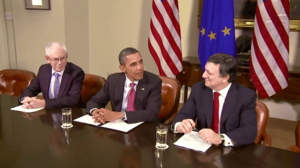
The European Council also asked him to lead a task force on economic governance. This group proposed better economic coordination within the EU. Its ideas were approved in October 2010.
His second year, 2011, also saw the Greek debt crisis worsen. Van Rompuy called special meetings of Eurozone leaders. They agreed on more measures to help Greece and prevent the crisis from spreading.
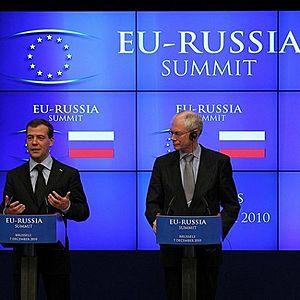
He also played a key role in coordinating European positions at international summits, like the G8 and G20. He called a special European Council meeting in early 2011 about the crisis in Libya.
On 1 March 2012, Van Rompuy was re-elected unanimously as President of the European Council. His second term lasted from 1 June 2012 to 30 November 2014. He could not be re-elected again after this, as the term limit is two terms.
Van Rompuy was also appointed the first President of the Euro Summit. These meetings of Eurozone leaders happen at least twice a year. In 2014, he received the International Charlemagne Prize for his work in the EU.
President's Team
The European Council has its own president, but its administrative support comes from the General Secretariat of the Council of the European Union. However, the President has a small team of close advisors. Van Rompuy chose Baron Frans van Daele as his chief of staff. His team also included Richard Corbett, Zoltan Martinusz, Odile Renaud-Basso, Luuk van Middelaar (his main speech writer), and Dirk De Backer (his press officer).
In 2013, Frans Van Daele retired and was replaced by Didier Seeuws.
After His Presidency
After his time as President of the European Council, Van Rompuy continued to be involved in European affairs. In 2019, he was appointed chairman of the board of the College of Europe. He also joined a group of experts to monitor a Hungarian political party's compliance with European values.
Other Activities
- Centre International de Formation Européenne (CIFE), President
- Club of Madrid, Member
- European Policy Centre (EPC), Chair of the Strategic Council
- Trilateral Commission, Member of the European Group
Awards and Honours
Belgian Honours Belgium
Belgium
- He was made Count van Rompuy by Royal Decree in 2015.
- He was named Minister of State in 2004.
- He received the Order of Leopold:
* Commander in 2003. * Grand Cordon in 2009.
Foreign Honours
 Benin: Grand Cross of the National Order of Benin
Benin: Grand Cross of the National Order of Benin France: Grand Officier of the Legion of Honour
France: Grand Officier of the Legion of Honour Ivory Coast: Grand Officer of the National Order of the Ivory Coast
Ivory Coast: Grand Officer of the National Order of the Ivory Coast Japan: Grand Cordon of the Order of the Rising Sun
Japan: Grand Cordon of the Order of the Rising Sun Netherlands: Knight Grand Cross of the Order of Orange-Nassau
Netherlands: Knight Grand Cross of the Order of Orange-Nassau Romania: Grand Cross of the Order of the Star of Romania
Romania: Grand Cross of the Order of the Star of Romania Slovakia: Grand Officer of the Order of the White Double Cross
Slovakia: Grand Officer of the Order of the White Double Cross- Received the Gold Medal of the Jean Monnet Foundation for Europe in 2014.
 Slovenia: Order for Exceptional Merits
Slovenia: Order for Exceptional Merits
Honorary Citizenships
 Beersel, Belgium (2012)
Beersel, Belgium (2012) De Haan, Belgium (2012)
De Haan, Belgium (2012) Olen, Belgium (2013)
Olen, Belgium (2013) Matsuyama, Japan (2013)
Matsuyama, Japan (2013) Kortessem, Belgium (2014)
Kortessem, Belgium (2014)
Academic Honorary Degrees
* Doctor honoris causa from the Catholic University of Louvain (2010) * Doctor honoris causa from the Ghent University (2011) * Doctor honoris causa from the Catholic University of Leuven (2012)
 Japan: Doctor honoris causa from the Kobe University (2011)
Japan: Doctor honoris causa from the Kobe University (2011) Azerbaijan: Doctor honoris causa from the Azerbaijan University of Languages (2012)
Azerbaijan: Doctor honoris causa from the Azerbaijan University of Languages (2012) Vietnam: Doctor honoris causa from the Vietnam National University, Hanoi (2012)
Vietnam: Doctor honoris causa from the Vietnam National University, Hanoi (2012) Spain: Doctor honoris causa from the CEU San Pablo University (2013)
Spain: Doctor honoris causa from the CEU San Pablo University (2013) Benin: Doctor honoris causa from the university of Abomey-Calavi (2014)
Benin: Doctor honoris causa from the university of Abomey-Calavi (2014) Netherlands: Doctor honoris causa from the VU University Amsterdam (2015)
Netherlands: Doctor honoris causa from the VU University Amsterdam (2015) United Kingdom: Honorary LL.D. degree from the University of St Andrews (2016)
United Kingdom: Honorary LL.D. degree from the University of St Andrews (2016) United Kingdom: Honorary D.C.L. degree from the University of Kent (2016)
United Kingdom: Honorary D.C.L. degree from the University of Kent (2016) Canada: Honorary LL.D. degree from Carleton University (2017)
Canada: Honorary LL.D. degree from Carleton University (2017)
Awards
 Germany: Charlemagne Prize (2014)
Germany: Charlemagne Prize (2014) Netherlands: Benelux-Europa Prize (2010)
Netherlands: Benelux-Europa Prize (2010) Belgium: Harvard Club of Belgium Leadership Prize (2010)
Belgium: Harvard Club of Belgium Leadership Prize (2010) Luxembourg: Collier du Mérite européen (2010)
Luxembourg: Collier du Mérite européen (2010) Spain: Nueva Economía Forum Prize (2010)
Spain: Nueva Economía Forum Prize (2010) Belgium: Golden medal of the Royal Flemish Academy of Belgium for Science and the Arts (2012)
Belgium: Golden medal of the Royal Flemish Academy of Belgium for Science and the Arts (2012) Belgium: Honorary senator E Meritu et Honoris Causa (2012)
Belgium: Honorary senator E Meritu et Honoris Causa (2012) Netherlands: Otto von der Gablentz Prize (2012)
Netherlands: Otto von der Gablentz Prize (2012) Austria: European Prize Coudenhove-Kalergi (2012)
Austria: European Prize Coudenhove-Kalergi (2012) Belgium: Michele de Gianni Award (2013)
Belgium: Michele de Gianni Award (2013) Poland: Golden Business Centre Club Statuette Award (2014)
Poland: Golden Business Centre Club Statuette Award (2014) Germany: ESMT Responsible Leadership Award (2014)
Germany: ESMT Responsible Leadership Award (2014) Netherlands: Comenius prize (2016)
Netherlands: Comenius prize (2016)
See also
 In Spanish: Herman Van Rompuy para niños
In Spanish: Herman Van Rompuy para niños
 | Kyle Baker |
 | Joseph Yoakum |
 | Laura Wheeler Waring |
 | Henry Ossawa Tanner |


